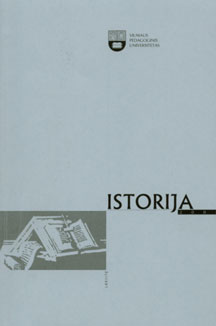Č. Laurinavičiaus ir A. Nikžentaitis siūlo: „1940 m. rugpjūčio 3 d. datą laikyti sąlygine Lietuvos ir Baltijos šalių okupacijos pabaiga“
Č. Laurinavičius and A. Nikžentaitis claim: „August 3, 1940, Could Be Considered the Date of the Conditional Termination of Lithuania’s ...
Author(s): Edvardas KriščiūnasSubject(s): History
Published by: Vytauto Didžiojo Universitetas
Keywords: Soviet occupation; the concepts of occupation and annexation; Č. Laurinavičius and A. Nikžentaitis; new attitude
Summary/Abstract: Č. Laurinavičius and A. Nikžentaitis consider August 3, 1940, to be the date of the conditional termination of Lithuania’s and other Baltic States’ occupation. The article, therefore, critically analyzes historiographical attitudes of Č. Laurinavičius and A. Nikžentaitis which, however, distort the history of occupation and annexation of the Baltic States. Pro-Russian attitudes are clearly expressed in the joint document collection The USSR and Lithuania during the Second World War, published by Lithuanian and Russian historians as well as in Č. Laurinavičius’ articles. Č. Laurinavičius and A. Nikžentaitis’ assumptions that the Soviet occupation ended on August 3, 1940, contradict historical facts, the official declarations of international community (the 2nd half of the 20th century), Lithuanian people’s will expressed in the referendum of 1992 and the law passed by the Seimas of the Republic of Lithuania which states that the Soviet occupation lasted from 1940 till 1990. Č. Laurinavičius and A. Nikžentaitis’ claim that annexation was the end of occupation also challenges international law and existing definitions of annexation and occupation. The international law views annexation as continuing occupation which is not legally recognized or accepted. In his articles Č. Laurinavičius as well as N. Lebedeva, the author of the introductory article of this publication, overlooked the role of the Soviet Union in the occupation of the Baltic states; they only tend to point to the mistakes made by the Governments of the Baltic States which supposedly led these countries to occupation. This anti-Lithuanian stance is grounded on biased historical documents which might give impression to the reader that Lithuania’s occupation was a natural consequence of strained relationships between the USSR and Lithuania; these documents do not disclose that this occupation was a conscious Soviets’ aggression. The rewritten history of Lithuania’s occupation by Č. Laurinavičius and A. Nikžentaitis inflicted considerable harm to all Baltic states, i. e. Lithuania, Latvia and Estonia. Firstly, the statement of these historians that the occupation lasted only for about one and a half month invalidates Lithuania’s citizens will expressed in the referendum of 1992 as well as the law passed by the Seimas in 2000 that Russia must compensate for the harm caused during the occupation in 1940–1990. Secondly, these statements might also enhance the pressure from Russia, assumingly defending the rights of Russian-speaking population, on Latvia and Estonia because the Parliaments of these countries, on the basis of the Geneva Convention of 1949, did not unconditionally grant citizenship to Russian colonists.
Journal: Istorija. Lietuvos aukštųjų mokyklų mokslo darbai
- Issue Year: 72/2008
- Issue No: 4
- Page Range: 71-78
- Page Count: 8
- Language: Lithuanian

